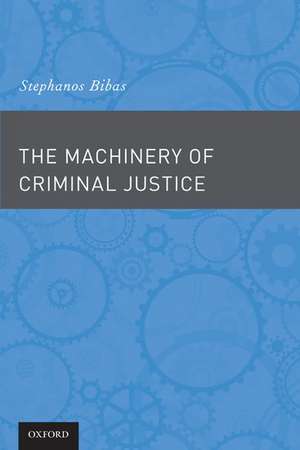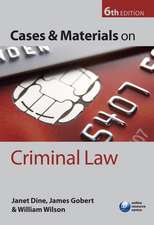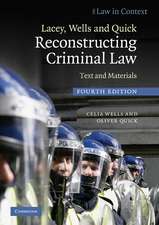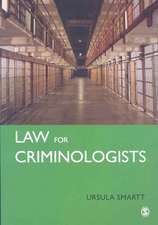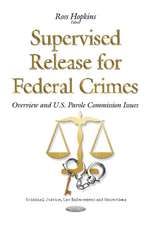The Machinery of Criminal Justice
Autor Stephanos Bibasen Limba Engleză Paperback – 5 mar 2015
| Toate formatele și edițiile | Preț | Express |
|---|---|---|
| Paperback (1) | 296.75 lei 31-37 zile | |
| Oxford University Press – 5 mar 2015 | 296.75 lei 31-37 zile | |
| Hardback (1) | 628.89 lei 31-37 zile | |
| Oxford University Press – 26 apr 2012 | 628.89 lei 31-37 zile |
Preț: 296.75 lei
Preț vechi: 333.86 lei
-11% Nou
Puncte Express: 445
Preț estimativ în valută:
56.78€ • 59.44$ • 46.98£
56.78€ • 59.44$ • 46.98£
Carte tipărită la comandă
Livrare economică 26 martie-01 aprilie
Preluare comenzi: 021 569.72.76
Specificații
ISBN-13: 9780190239282
ISBN-10: 019023928X
Pagini: 320
Dimensiuni: 231 x 152 x 25 mm
Greutate: 0.62 kg
Editura: Oxford University Press
Colecția OUP USA
Locul publicării:New York, United States
ISBN-10: 019023928X
Pagini: 320
Dimensiuni: 231 x 152 x 25 mm
Greutate: 0.62 kg
Editura: Oxford University Press
Colecția OUP USA
Locul publicării:New York, United States
Recenzii
In The Machinery of Criminal Justice, author Stephanos Bibas presents a bold and inspiring vision of what criminal justice and the punishment imposed in its name can and should be about. Criminal justice is ideally the process, and punishment ideally the vehicle, through which wronged and wrongdoer restore the bond they once shared. Restoration, not retribution or deterrence, is the rock upon which Bibas builds."
The Machinery of Criminal Justice is an exceptional volume that gives us the big picture on a scholarly subject too often hobbled by technical focus and narrow thinking. Always accessible and always interesting, Bibas asks some hard questions and gives some creative answers. Common morality, lay justice, mercy, re-integrative punishment - these are the issues at the cutting edge of today's crime policy debates, but Bibas shows us that they are also the historical roots of American criminal justice."
Th[e] embrace of populism as a counterweight to expertise sets Bibas apart. The academics and professionals who work in criminal justice routinely look for ways to insulate criminal punishment from popular passions; they hope to take advantage of specialized professional insights. Bibas offers a bracing challenge to this received expert wisdom."
Through a series of articles spanning more than a decade, Professor Stephanos Bibas has proven himself a bold and penetrating critic of America's system of criminal procedure. His theme has been the gap between the morality embodied in our substantive criminal law and the morality (or, perhaps more accurately, the lack thereof) embodied in our procedural rules and practices. This theme now gets its fullest exposition in his provocative new book, The Machinery of Criminal Justice."
His vision is a powerful one, he defends it with clarity and grace, and every idea he expresses is capable of starting an important conversation."
The Machinery of Criminal Justice is an exceptional volume that gives us the big picture on a scholarly subject too often hobbled by technical focus and narrow thinking. Always accessible and always interesting, Bibas asks some hard questions and gives some creative answers. Common morality, lay justice, mercy, re-integrative punishment - these are the issues at the cutting edge of today's crime policy debates, but Bibas shows us that they are also the historical roots of American criminal justice."
Th[e] embrace of populism as a counterweight to expertise sets Bibas apart. The academics and professionals who work in criminal justice routinely look for ways to insulate criminal punishment from popular passions; they hope to take advantage of specialized professional insights. Bibas offers a bracing challenge to this received expert wisdom."
Through a series of articles spanning more than a decade, Professor Stephanos Bibas has proven himself a bold and penetrating critic of America's system of criminal procedure. His theme has been the gap between the morality embodied in our substantive criminal law and the morality (or, perhaps more accurately, the lack thereof) embodied in our procedural rules and practices. This theme now gets its fullest exposition in his provocative new book, The Machinery of Criminal Justice."
His vision is a powerful one, he defends it with clarity and grace, and every idea he expresses is capable of starting an important conversation."
Notă biografică
Stephanos Bibas is a professor at the University of Pennsylvania Law School, where he specializes in criminal procedure. As director of Penn's Supreme Court Clinic, he also litigates a wide array of cases before the Supreme Court of the United States. After graduating from Yale Law School and clerking at the Supreme Court, he worked as a federal prosecutor in New York City, where he prosecuted a wide array of criminal cases. He successfully investigated, prosecuted, and convicted the world's leading expert in Tiffany stained glass for hiring a grave robber to loot priceless Tiffany windows from tombs in cemeteries, winning an FBI award for outstanding performance. He has published widely on plea bargaining, sentencing, and how criminal procedure could better serve the substantive moral goals of the criminal law.
